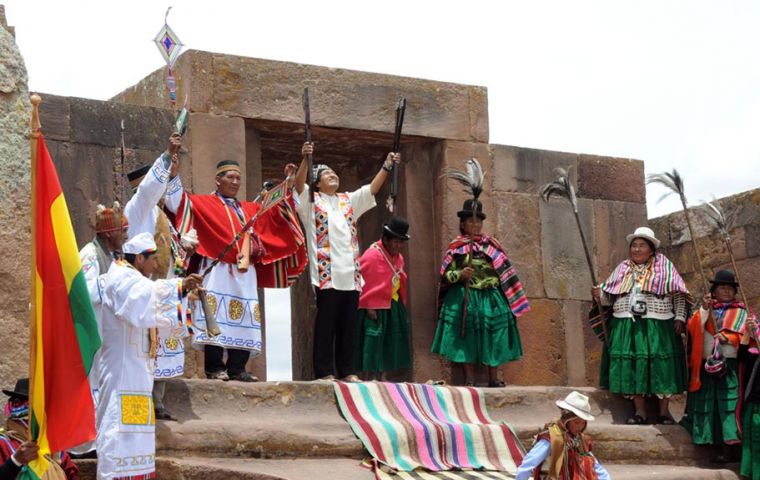MercoPress. South Atlantic News Agency
Morales becomes head of a pluri-national state blessed by Aymara gods
 At the Akapana pyramid the Bolivian president was handed the baton of leadership
At the Akapana pyramid the Bolivian president was handed the baton of leadership Bolivian president Evo Morales will be inaugurated Friday before Congress for a second mandate (2010/2015) after having achieved an overwhelming victory in December elections (64% of the vote) ensuring him majority control of both houses.
The ceremony will also mark the enactment of a new constitution with sweeping reforms upgrading the social and political conditions of the majority indigenous population of one of South America’s poorest countries.
Morales, the first indigenous elected president referred to Friday January 22 as the “re-foundation” of Bolivia: the end of the colonial state and its replacement by a “pluri-national” state which guarantees equality and justice for all and “respects private property”.
“We had to wait 180 years for the re-foundation of Bolivia and now we have a re-founded Bolivia which guarantees us a pluri-national state where all indigenous have the same rights: the several millenniums indigenous and the contemporary indigenous”, anticipated Morales.
Speaking at the end of an indigenous ceremony Morales said “we are before a state that has died and another that is born. Gone for ever is the colonial state which was permissive to the standing looting of our natural resources, and gone also is the discriminatory colonial state”.
Morales also signed a decree declaring January 22 the Pluri-national State Foundation Day and a national holiday to be celebrated annually. On that date but in 2006, Morales took office for the first time.
However August 6 which recalls the birth of Bolivia, when the dismembering of the Spanish empire in South America, back in 1825 will continue to be celebrated as a national day.
Morales finished his speech repeating the words of a former president Gualberto Villarroel, killed in 1946 by the extreme right: “I’m not an enemy of the rich, but I’m friendlier with the poor and disposed”.
On Thursday Morales (who belongs to the Aymara ethnic group) participated in the traditional indigenous festivity which conferred upon him the spiritual leadership of the different peoples of Bolivia at the sacred pre-Hispanic Tiawanaku citadel, 70 kilometres from the capital La Paz and 3.800 metres above sea level.
Aymara elders and representatives from other indigenous peoples dressed in ceremonial white tunics combined with colourful Andean designs dating back to the tiahuanacota culture completed several rituals at the Akapana pyramid while Morales, at precise mid day, was handed the baton of command by a couple of children.
Previously at the pinnacle of the pyramid Morales had to address the four cardinal points and received blessings in the different indigenous languages while complying with ritual offerings of coca leaves and alcohol to Pachamama (mother earth) and to Tata Inti (Sun God).
Indigenous priests “amautas” later called on the gods at the four cardinal points to bless the leader and render on him “knowledge, wisdom and humbleness”.
Thousands of indigenous peoples from the four cardinal points of Bolivia were present at the ceremony in the tiahuanacota temples that belong to a pre-Inca culture and are revered as the most sacred in the Andes highlands.
In 2006, when he was first elected, Morales participated in a similar ceremony which signalled the rebirth of traditional indigenous rituals and cultural traditions.




Top Comments
Disclaimer & comment rules-

-

Read all comments<a href=“http://airmax-shoe.com/air-max-90-c-3.html?zenid=314007dcbd792a44e2225dc420be9e88”>Air Max 90</a>
Jan 22nd, 2010 - 08:51 pm 0<a href=“http://www.ajf4.com/category-86-b0-Michael+Jackson+Memorial.html”>Michael Jackson Memorial</a>
Jan 27th, 2010 - 11:05 am 0Commenting for this story is now closed.
If you have a Facebook account, become a fan and comment on our Facebook Page!